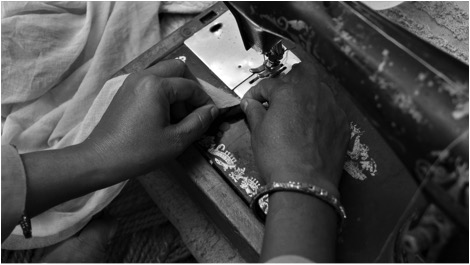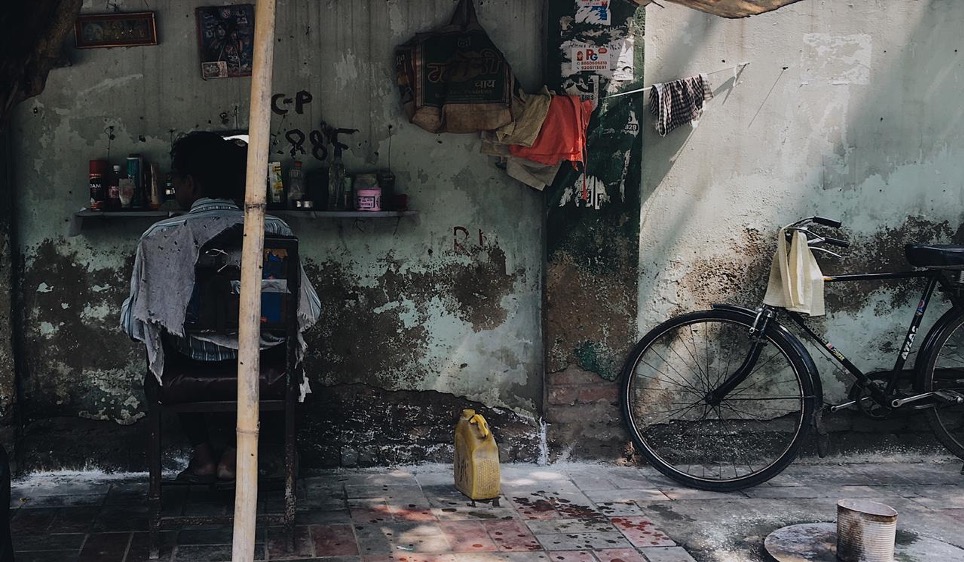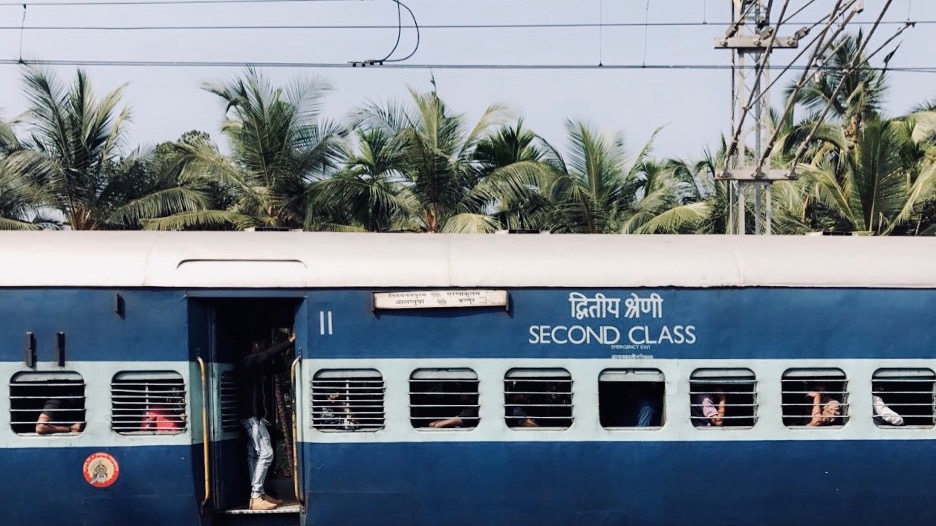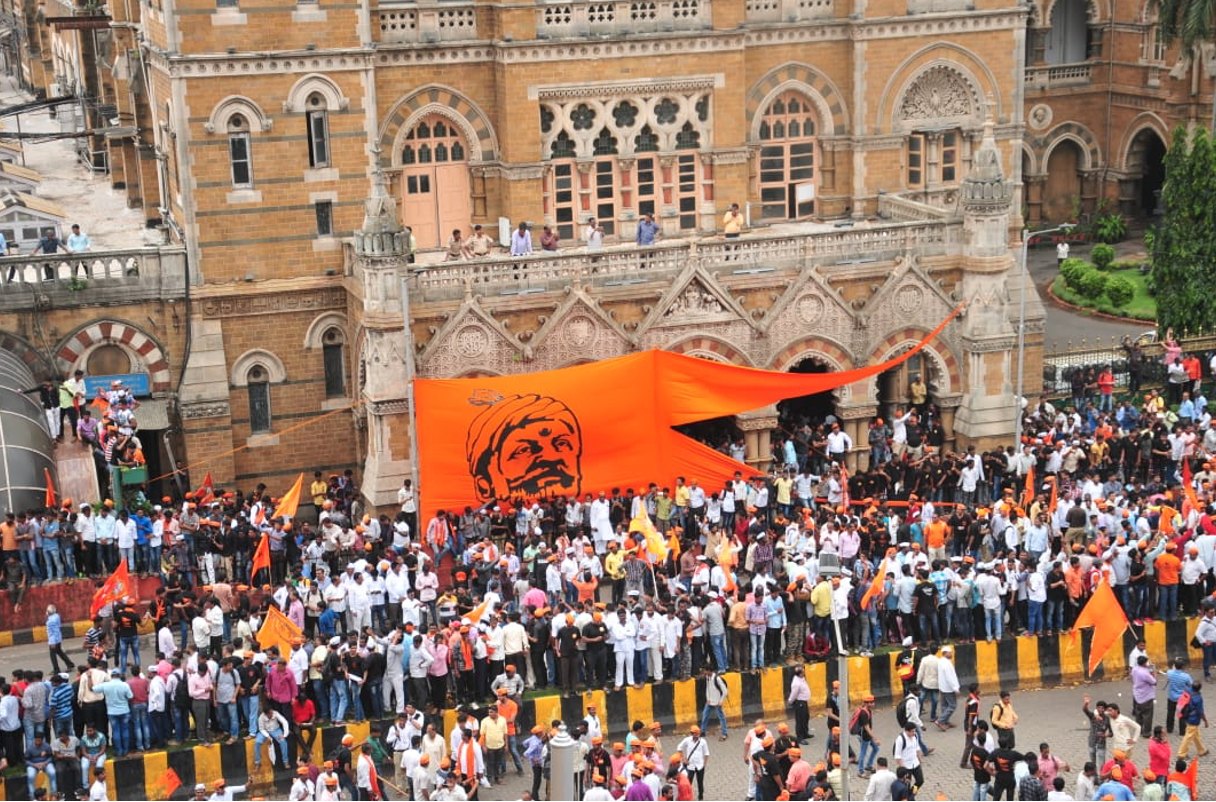The Indian informal economy accounts for roughly 90% of India’s total workforce, with the degree of informality varying across indices of gender, geographic location, sector and job. While some employed in this sector are visible, others face uncertainty and precarity because of entrenched social and institutional factors that curtail their recognition and entitlements. Here Harshita Sinha (PhD Candidate, International Development, LSE) reports on three lives from the informal sector impacted by India’s lockdown in response to the spread of COVID-19.
 Credit: Author
Credit: Author
The Seamstress and the Rickshaw Puller
Asha, a 39-year-old women currently living in New Delhi, recalls working alongside her sister-in-law before lockdown. Just a few weeks ago, she would sit by her side and pass stitching tools to her as she made her garments for customers outside a shop in the local market in their slum dwelling. Her husband, Sham, worked as a rickshaw puller. Sham rents his rickshaw for Rs. 400 every day from Sahab (the Boss), and everything he earns after paying this rental cost goes straight to his family. Asha and Sham, both workers in the informal sector, rely on their daily wages to support their family of three children.
Since the COVID-19 lockdown, both Sham and Asha have struggled to make ends meet. During the first stage of lockdown, they recalled being able to manage and sustain their livelihood through safety nets and seeking help from their relatives and neighbours in the area, however ever since the extension to the lockdown, they were unable to continue to rely on this network, as there was a general sense of fear in these households because of the spread of the virus. Asha recalls all of this to me while standing in the queue to collect pre-prepared food at her local food relief distribution centre. She remembers how she soon found that these supplies wouldn’t stretch very far, as the centre can only help her family with one meal a day.
Asha told me, “Since the last three days, I haven’t been able to turn on the stove in the house, as we’ve run out of cooking gas. I don’t know who to ask, and how to feed my kids. I can’t feed them uncooked meals and we can’t ask the people for help anymore…My husband pulls a rickshaw, so while the government scheme gave coverage to rickshaw pullers, my family remained ineligible because he couldn’t produce any documents supporting the claim that he rents the rickshaw…The person he rents the rickshaw from relies on the rent to sustain his business and in these times even he won’t give a handout to Sham as his business to rent rickshaws is completely under water.”
Commenting on her work situation, she said, “My work of stitching doesn’t allow us to save a lot. I rely on daily or weekly payments to make ends meet. I asked some of my customers for my payment in the wake of lockdown, but everyone is facing their own hardship, and some chose to cancel their orders rather than pay right now.”
The nature of Sham and Asha’s work brings forth the multidimensionality of informality. In the current state of crisis caused by COVID-19, these dimensions of informality have been accentuated while making their impact more visible. While there are certain provisions for the informal sector, the multi-layered nature of informality for India’s sub-class within the informal economy (in this instance service providers and rickshaw pullers who don’t own the means of production but rather rent them) face an institutional barrier in making claims for services and relief goods. Since the lockdown, their means of coping include relying on informal networks and NGOs to obtain essential services and food grains.
The nature of informality and type of occupation within the informal sector precludes many in availing the schemes and entitlements being offered. The uncertainty and lack of institutional recognition from the pre-COVID society has not only brought this to light but increased the vulnerability of many informal workers in such times of crisis.
 Photo credit: Author
Photo credit: Author
The Mason and the Domestic Helper
Raju, 29, a mason from Bihar, used to work at a construction site. He and his wife Jai Devi migrated to Delhi six months ago. Raju’s wife works as domestic help to sustain and feed a family of two children of three and one years old. With their joint income, Raju could return some of his money to his mother in his home village. Living in an unauthorised colony in Delhi, Raju and Jai Devi rent a small 6×8 room. Raju has worked for 10-15 days a month since his arrival in Delhi in last three months, while Jai Devi worked in three different houses for seven hours a day for 25 days a month.
Before the lockdown, living in an unauthorised settlement for Raju meant relying on his landlord to ensure a supply of electricity and water to his house. Raju recalls being able to sustain the initial two weeks of the lockdown from their income, however since Jai Devi was only recent hired in two of the households she used to work in, she was amongst the first of many to lose her job. While Raju’s contractor found himself struggling to pay his employees, he was only able to help those who had been working for him for a longer period of time – a category Raju did not fall into.
Raju recalls the initial period of lockdown as being extremely unsettling, due to a conflict with this landlord. While having paid the rent for his flat for the month of march, and though the Government had asked landlords to be sensitive towards tenants for rent during the lockdown. Raju and Jai Devi found it extremely difficult to sustain their family and cover April. Now there is no electricity and water supply in his house. The landlord was adamant for his rent and threatened eviction.
Speaking about this experience, Raju told me, “I have been humiliated: called names and abused, with my wife and children having to stand outside the house even in the lockdown, because it became unbearable to stay and listen to our landlord taunt. Having had to rely on our landlord for water and electricity, we found ourselves without choice [but to leave].”
“In desperation,” Raju said, “I spoke to Seth (Raju’s contractor) who had told us to rent a flat from another landlord who is his acquaintance, but in the last few weeks even he refused to speak to him or negotiate on my behalf. I am a nobody, but the landlord would have definitely budged if Seth had of spoken to him.”
Talking about his landlord, Raju said, “I came to this city for a better life, but now, I can’t wait to go to my ghar (house in Bihar). This city is nobody’s, at least back home someone would have helped out of good faith, but here I am disposable at the mercy of people, be it for my dihadi, ghar aur zindagi (Wage, house and life)”.
Over the last month, migrant workers in India have found themselves in extremely precarious situations. This precarity that we see, is not merely a result of their position in the job market but also in terms of their presence in the city. Like Raju, many migrant workers find themselves relying on intermediaries (such as their landlords, employer or contractor) to negotiate access to even the most basic necessities in the city. While relying on informal cliental networks as a mode of subsistence for workers in the city, the struggles and hardships have accentuated in the last month for many. The threat of eviction and having to constantly bargain access to even the most basic necessities, such as water, have pushed many migrant workers to the brink in urban spaces. Alongside the health concerns of the pandemic, the major concern for many migrant workers in the cities who haven’t moved back to their state of origin is the means and methods of their struggle to negotiate their safety and household in Delhi.
Even with the state’s advisory for relief on rent, the lived reality of many workers is far from it. Raju and Jai Devi’s situation highlights the multi-dimensionality of informality being created and reinstated across board in the lives of informal workers. The domino effect of network dependency which the migrant workers find themselves facing in the city during the pandemic is reflective of the structured absence of the workers and their realities in the conceptualisation of needs for the city.
 Photo credit: Author
Photo credit: Author
The Migrant Worker
Rahil, 22, a migrant worker from Bengal, lives with five other construction workers in a small rented room in a flat near a construction site in Delhi. He came to Delhi in February with his uncle to support his family, after the sudden death of his father. While moving to the city to work (like many others from his village) was a rite of passage to a better livelihood and status, his current desperation in lockdown to sustain his family wasn’t. It had hardly been a month since he arrived in Delhi that the lockdown was introduced. New to the city, he found company with other workers in his current dwelling. Rahil and three other members of his flat work on a rota at the construction site through a sub-contractor. They aren’t however officially registered as labourers at the site, thus stripping them of the housing and medical claims that other workers are entitled to.
Three weeks into the COVID-19 lockdown, Rahil finds himself completely stripped of resources. As the construction site has closed down, many of the sub-contracted labourers found themselves out of a job overnight. Just when the shock of a pandemic and loss of employment had severed his hope of a better life, Rahil along with others, was forced to vacate his room. Recounting how he navigated the situation, he said, “I didn’t know who to ask for help, or who to beg from. The Thekadar, (Subcontractor) had stopped answering our calls. We heard some of the others [tenants] had been beaten up in the initial weeks, as they stepped to look for people at the site. After Ajay (another migrant worker) broke his leg attempting to head back, I was sceptical of taking any chances. But soon after I was thrown out of the room, having no other respite, I tried to cling to whatever was possible. I moved to a tented dwelling near the construction site.”
“I have been running in circles and no one cares,” he continued. “We tried to sustain ourselves with meal distributions, but there were days where we had one meal in two days…I tried getting the ration from the government distribution system, but I didn’t have a ration card. Our Thekadar had told us he’ll help up us with getting the card made next month but with all this (referring to the pandemic and lockdown), I don’t think there would be any need. Either we’ll die of disease or of hunger.”
Since the third phase of lockdown began, which allowed for the relaxing of certain economic restrictions, many construction and other economic activities have started operating in many districts across India. However Rahil, and many like him, are waiting to leave the city and return home to their villages. While construction has started, the deprivation and set of events since last month, has set in place a grave sense of uncertainty not only about the worker’s lives in cities, but also of their families back home. Workers like Rahil are desperately waiting to return home, even in the light of a renewed possibility of work. “Everyone is a stranger here, I am nobody and nobody’s mine; they don’t care if I live or die. I’ll be able to sustain my family only if I am alive and right now home is the only place where that seems to be a possibility,” said Rahil.
While speaking to Rahil he said, “Kam ka jugaad hojaega, ghar jane do abh (We’ll figure out work, just let us go home). I want to be there with my family. In the last month, I have been more scared for my life than I would have ever imagined. I want to be home, the rest is immaterial right now. Everyone is a stranger here, I am nobody’s and nobody’s mine, they don’t care if I live or die. I’ll be able to sustain my family only if I am alive and right now home is the only place where that seems to be a possibility.”
As I share Rahil story, since the lockdown, hundreds of migrants workers in India have lost their lives not due to the disease, but due to starvation, fatigue and the exhaustion of walking over hundred kilometres to reach their village homes. Thousands are still undertaking these journeys, while a million more struggle to navigate the system to return home. These cycles of hope, misinformation and exploitation during the lockdown have left many migrant workers broken, yet their relentlessness to keep trying remains: trying to sustain and persevere their lives, and most of all, trying to not give up against the odds of systematic failure.
Today as the hierarchy of class and privilege shields many, the lack of it has exposed the labour market in India to the hands of even more systematic exploitation, with limited choices of recourse. As India restarts economic activity, I hope the voices of millions whose plight until now was seen as invisible in the informal sector is recognised and acknowledged, especially so as two states in India, Madhya Pradesh and Uttar Pradesh are set to relax their labour laws, including the Minimum Wages Act, the Equal Remuneration Act, the Trade Unions Act, the Industrial Employment (Standing Orders) Act, the Industrial Disputes Act, the Factories Act, the Contract Labour Act, the Inter-State Migrant Workmen Act and the Unorganised Workers’ Social Security Act amongst others. The next few months stand as a defining period for the foreseeable future of the Indian welfare state, where it can consciously choose to prioritise and structure its path either by accounting for the development for its people or at the cost of its people and labour.
Note: All members part of these series are successfully in touch with NGO’s working on ground to provide food relief materials to informal sector workers, who are facing hardships due to the COVID-19 Pandemic. All names in this piece have been changed.
This article gives the views of the author, and not the position of the South Asia @ LSE blog, nor of the London School of Economics.
These three stories first appeared separately on LSE’s International Development Blog.








Very informative article. Thanks for posting this. Please visit my blog https://www.dhansikhi.com